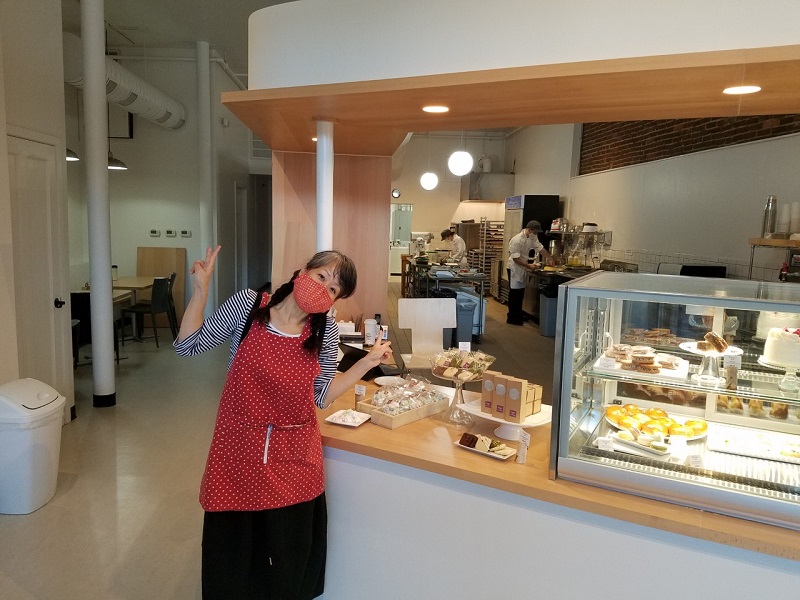Since it opened in November 2020, Suzu’s Bakery has garnered much love in the Champaign-Urbana community. While people may know quite a few of their pastries and drinks by now, I expect most don’t know the story behind Suzu’s.
Why start a Japanese bakery in Downtown Champaign? Where did the expertise to make Japanese sweets come from? How do the chefs at Suzu’s decide what to create each week? Learn the answers to these questions and more in this interview I had with Jennifer-Gunji-Ballsrud, one of the owners of Suzu’s Bakery.
Smile Politely: Can you introduce yourself and the other owners of Suzu’s: A Japanese Bakery to the readers of Smile Politely?
Jennifer Gunji-Ballsrud: My name is Jennifer Gunji-Ballsrud, and I am one of the owners of Suzu’s, a Japanese Bakery. My partners include: Suzuko Enomoto, Alex Sentowski, and Nan Goggin.
SP: What led to a Japanese Bakery opening in Downtown Champaign?
Gunji-Ballsrud: My good friend and partner Suzuko Enomoto is a Japanese chef who I met about six years ago when she was introduced to me through a mutual acquaintance in Japan. Through this connection, I invited Chef Enomoto to Japan House to present her culinary talents with our supporters in a rare sit-down 12-course dinner.
From the success of that event, we continued to work together yearly featuring her as a chef at Japan House events. As our relationship developed, she told me she was interested in starting a business in the States and the discussion of a bakery began. When I learned of the closing of Cream and Flutter, I decided to move forward with starting a Japanese bakery in their space.
SP: What obstacles did the team overcome to open a bakery?
Gunji-Ballsrud: Well, we opened during a pandemic! It was quite the challenge, and we had many hesitancies and had to deal with a great deal of issues with the situation that was at hand. However, we figured out how to navigate this with curbside delivery and only allowing two people at a time in the bakery, and, of course, no seating inside.
We were overwhelmed by the generosity and support that the community provided us. People were extremely respectful and kind. Now, we have so many regular customers and new people visiting daily.
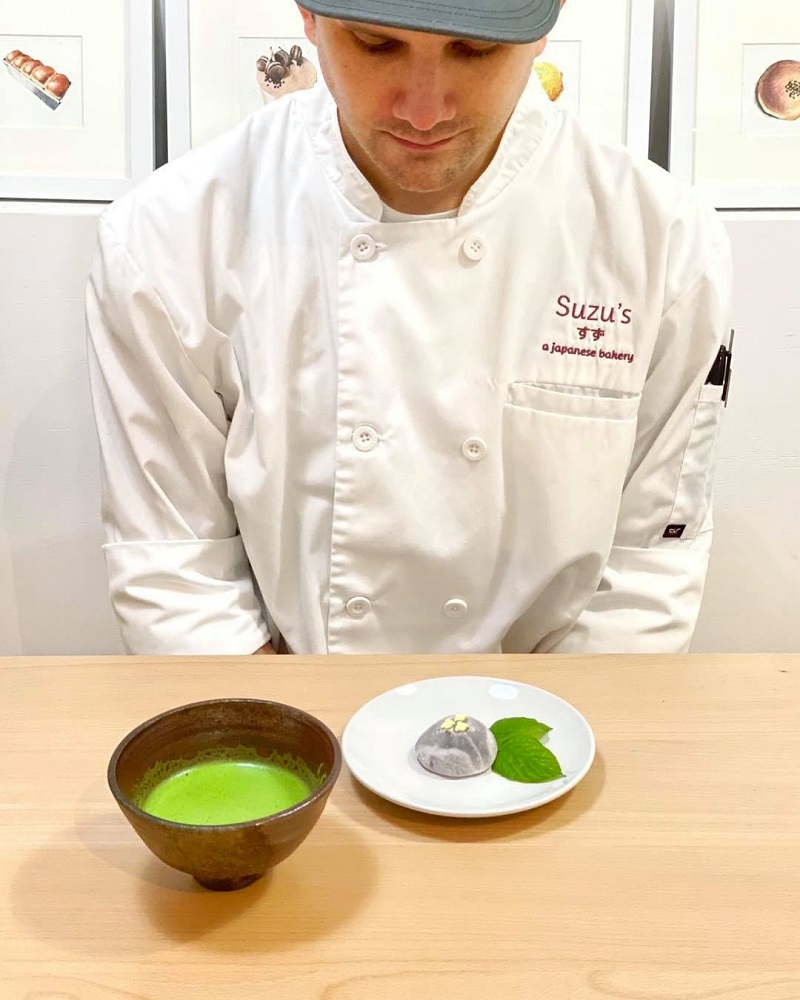
Photo by Suzu’s Bakery.
SP: What is it like working at the bakery? Can you describe a normal day at Suzu’s?
Gunji-Ballsrud: It is go-go-go. I only work one day a week there since I have my other full-time job. But on that day, Chef Alex starts at 4:30 in the morning, and we bake everything fresh daily. There are no shortcuts taken. All products are made that day, and all custards and creams are made fresh. The shop opens at 10 a.m. and we take online orders and walk-ins.
Depending on the day, Chef Alex might have to also make eight to ten special order cakes on top of everything else that needs to be made for the day. As things get safer in the world, we hope to offer more special order options and opportunities for catering events. This will definitely impact how things are done at the bakery, but we are excited to forge ahead.
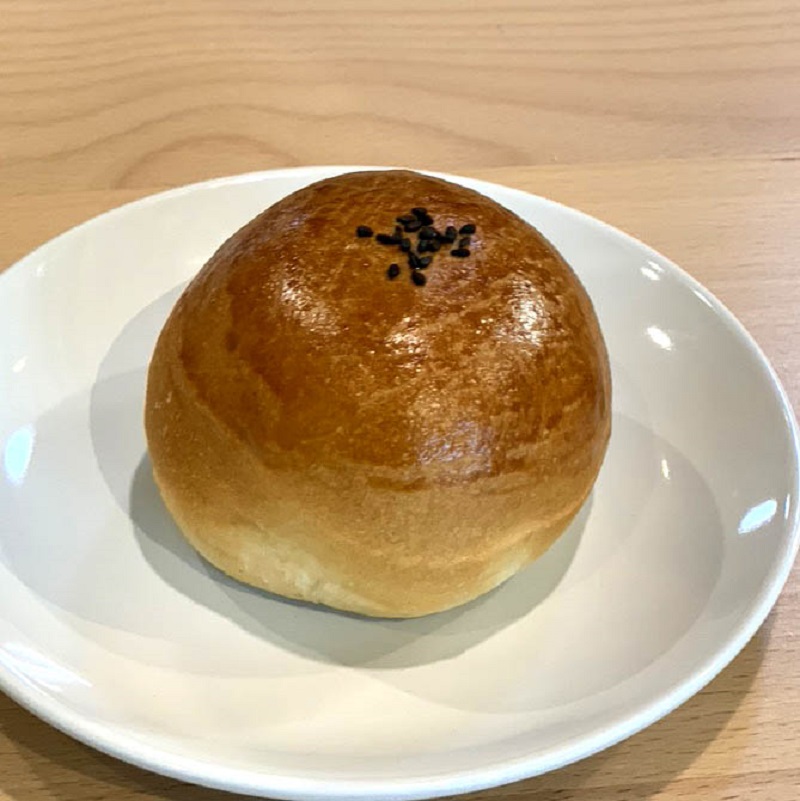
An pan. Photo by Suzu’s Bakery.
SP: Which pastry is the most difficult to make?
Gunji-Ballsrud: I believe that our an pan, cream pan, seasonal pan are the most tedious. The custard is made fresh slowly and carefully, and then the bread is also mixed, set to rise, kneaded, filled, decorated, and baked. An pan is a traditional Japanese sweet roll that is filled with adzuki beans. We also make these sweetened red beans from scratch.
SP: Which pastry is your favorite?
Gunji-Ballsrud: I like everything that we make, but I think the shokupan, Japanese milk bread, is very delicious (we offer it on Wednesday, Friday, and Saturday). It is a soft white bread that is outstanding for eating fresh, toasted, or eventually made into French toast.
I like all of the products that use matcha, too. We import our matcha from Marukyu Koyamaen in Kyoto, Japan. It is a highly recognized tea company in Japan, and we have the great honor of getting our matcha that we bake with and serve in our bakery from such a respected company.
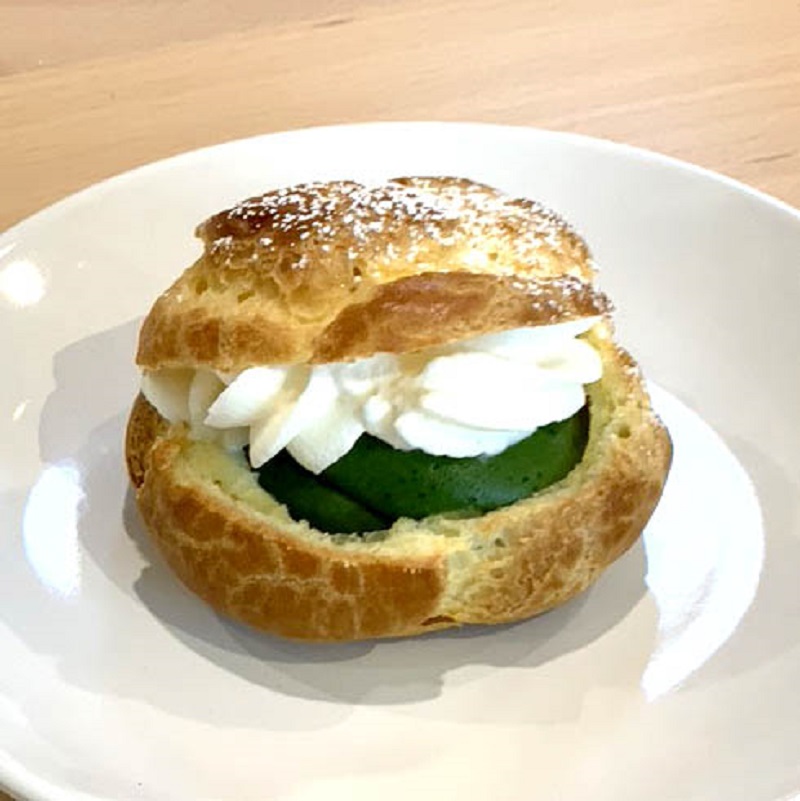
Matcha shu cream. Photo by Suzu’s Bakery.
SP: In what ways does the pandemic affect the day-to-day operations at the bakery?
Gunji-Ballsrud: We don’t know any differently since we opened in November during the pandemic. I think the re-opening of the state and country will affect us greatly. We will move slowly and cautiously. We are in no rush to have indoor seating because of the limited space. We hope to offer some outdoor seating soon, but we will see how our community does for the first month of summer. If we feel that things are safe for all, we will start to offer indoor seating.
Ultimately, when we first opened, we wanted to bring a bit of joy to this community. Everyone was grappling with the same confusion, frustration, and grief on many levels. Thus, opening during the pandemic, although it was a bit crazy, we did find it brought happiness to many people.
SP: How were the decisions made for what to bake at Suzu’s when it first opened?
Gunji-Ballsrud: It was all about how to make products that are truly authentic and found in Japanese bakeries. With Enomoto-san living in both Japan and Champaign, she is able to keep a pulse on what is trending in Japan and bring those ideas back to Suzu’s Bakery.
Of course, there are certain ingredients which are harder to get here in the States, but we do our best to balance out ingredients, flavor, and aesthetics. We also do our best to keep in mind what a Western palate is accustomed to and what is acceptable in terms of taste and enjoyment. It is a balance, but mostly, we work within the practices and flavor profiles that are authentically Japanese: less sweet, all-natural ingredients, and made from scratch.
SP: For someone coming to Suzu’s for the first time, what should they make sure to try?
Gunji-Ballsrud: I think everyone should try a pan, and the second thing that they should order is a shu kurimu, a Japanese cream puff. Again, our choux pastry is made from scratch in house along with the lovely custards that fill them. We have our standard three flavors of chocolate, vanilla and matcha.
Also, we added hojicha, a Japanese tea flavor that has a bit of a roasted, caramel taste. It is a type of tea in Japan that has been around since the early 1900s. Recently, hojicha flavored treats are gaining popularity across Japan. We hope that Suzu’s will also encourage people to try this lovely tea flavor, too!
SP: Are there vegan or gluten-free options at Suzu’s?
Gunji-Ballsrud: Right now, we have one regular gluten-free and vegan option which is our chocolate okara cake. This mini cake is truly a decadent, moist, and chocolatey cake that anyone would love if they love chocolate! We make it using okara, which is a soy pulp that is a result of tofu making. We also have been making mochi, a popular Japanese rice cake made of glutinous rice flour, sugar, and water. It is available on Wednesdays only and is filled with a strawberry and bean paste, or the traditional mochi with red bean paste.
SP: Are there pastries only available certain days of the week you want to especially point out to people? What are the different daily specials?
Gunji-Ballsrud: Yes. You can have shoku pan, milk bread, on Wednesday, Friday, and Saturday. Mochi and ichigo mochi, Japanese rice cake and Japanese rice cake with strawberry, are available only on Wednesday.
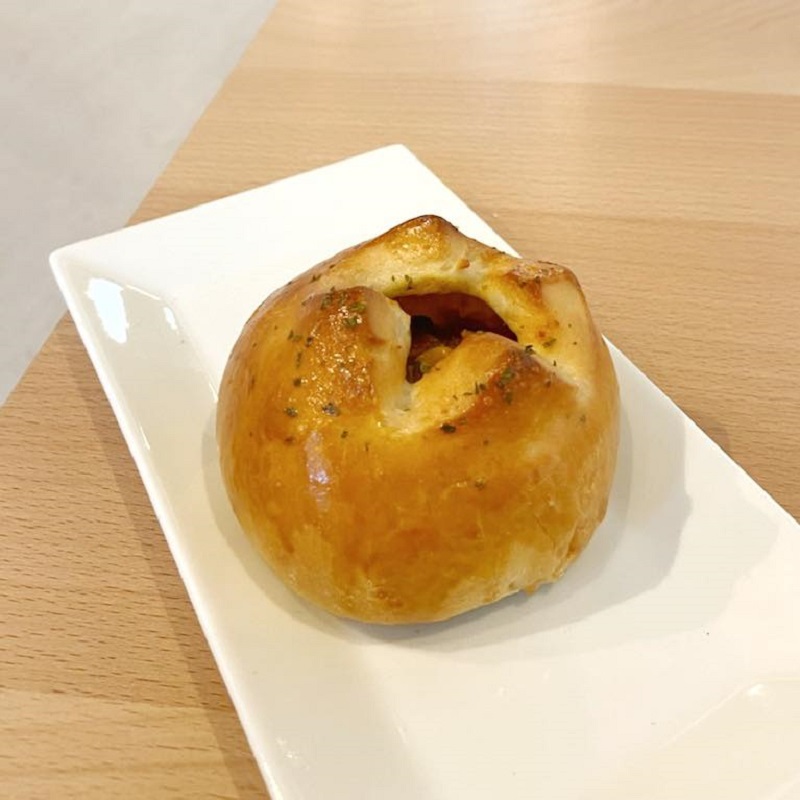
Curry pan. Photo by Suzu’s Bakery.
Curry pan, a vegetarian Japanese curry baked in a pan, the same recipe used for our an pan and other pan, can be purchased on Thursday.
The flavor of the roll cake slices changes everyday but could be chocolate, strawberry, matcha, hojicha, or chef’s choice.
SP: What seasonal pastries will there be in the months of May and June?
Gunji-Ballsrud: We are striving to release Kohi Zeri, which is Coffee Jelly. It is a very delicious common dessert in Japan. It is sweetened coffee that is made into a jelly using agar agar. This jelly is served with heavy cream and is a delightful summertime (or anytime) treat.
We will be introducing a few other new items too, but we will release that via social media.
SP: Can people eat their sweets inside of Suzu’s?
Gunji-Ballsrud: Soon.
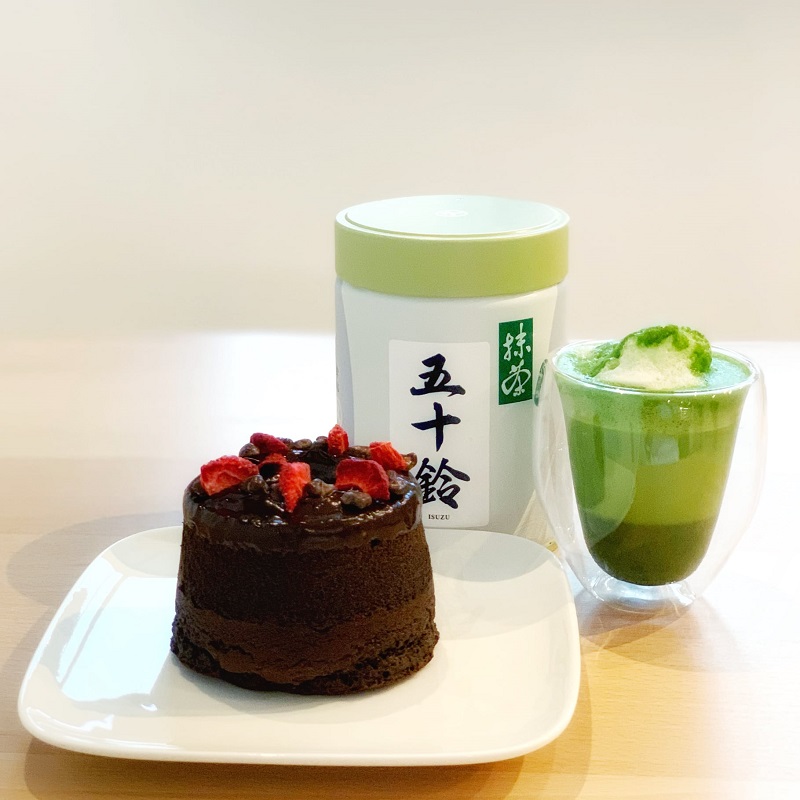
Photo by Suzu’s Bakery.
SP: What beverages are a specialty of Suzu’s?
Gunji-Ballsrud: Matcha! Our matcha, as I mentioned earlier, is imported from one of the best tea plantations in Kyoto, Japan. We make a wonderful matcha latte, and you can also order straight matcha. We have a variety of teas steeped teas from Koyamaen, too — sencha, hojicha, and genmaicha. We have a selection of teas from the Republic of Tea, too.
SP: In what ways can visitors buy from Suzu’s?
Gunji-Ballsrud: In store or online.
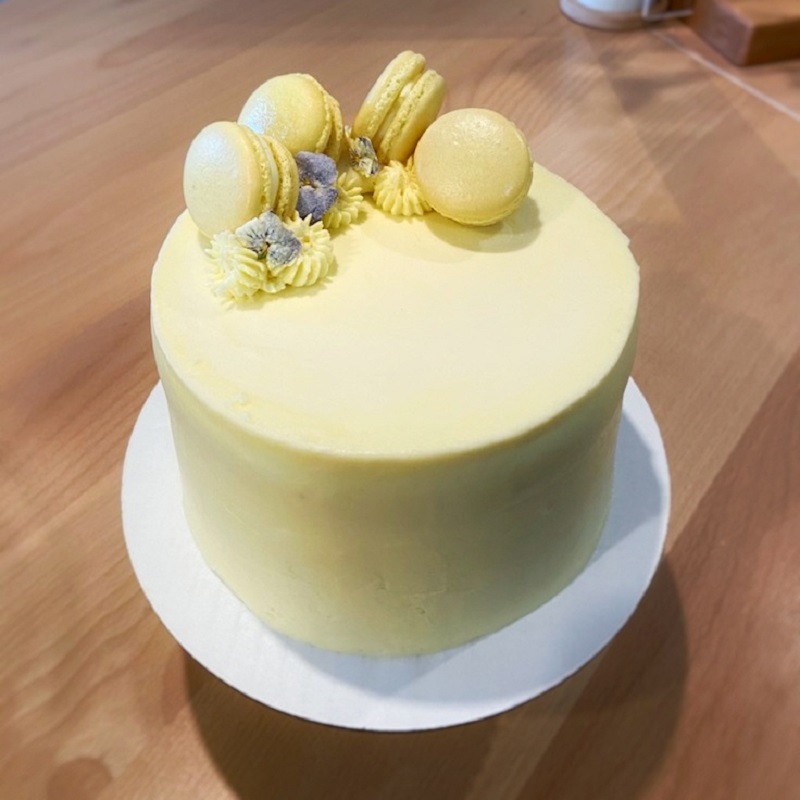
Photo by Suzu’s Bakery.
SP: Are there any sweets that must be ordered in advance?
Gunji-Ballsrud: Our cakes must be ordered at least 24 hours in advance. Our cakes are very special. They are light and delicate, and the chef always makes them the day they are ordered. We need to prepare for all cakes, and we do not have any ready-made full cakes except for our six inch Japanese cheesecake. We try to have one or two on hand daily for people who need a cake last minute.
SP: Are you looking for more staff?
Gunji-Ballsrud: We are. We are always looking for good people who believe in and appreciate a Japanese aesthetic and work sensibility to work at the bakery.
SP: Do you have anything to say to the Champaign-Urbana community?
Gunji-Ballsrud: I think I somewhat stated this in my earlier answers, but I truly do believe we have an amazing community. Suzu’s wanted to provide new offerings to the community, not to take away from anyone else, but to be additive. Our products are unique in the style and taste. With less sugar and Japanese ingredients and influences, our products bring a new flavor profile to baked goods for C-U.
We hope that Suzu’s is truly a place of joy and delight, and that we can continue to exist in our community for years to come. Each month, we hope to build upon what we have established and grow our menu and our offerings. We hope that everyone will at least give us a try!
We do thank our community so much for all the support that they have given us over the seven months that we have been open. We are so grateful.
Suzu’s Japanese Bakery
114 N Walnut St
Champaign
W-Sa 10 a.m. to 6 p.m.
Su 10 a.m. to 5 p.m.








